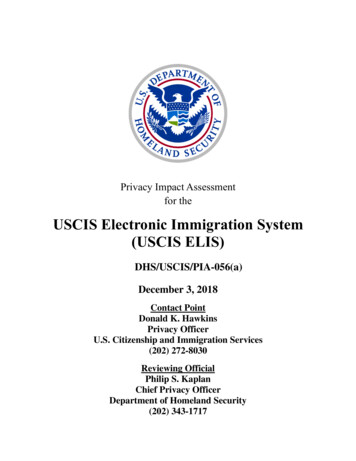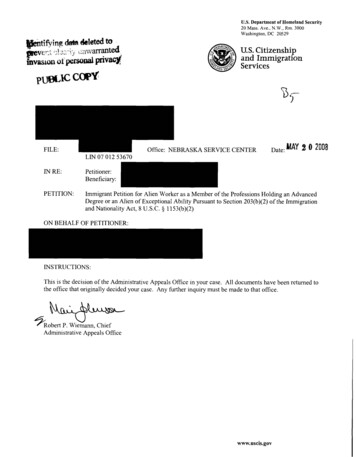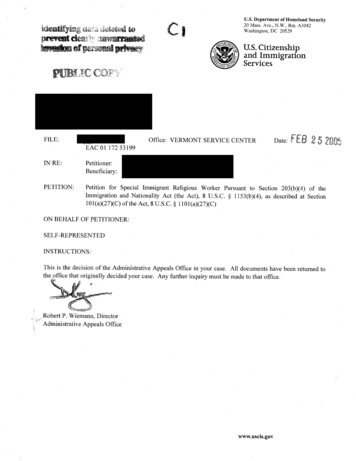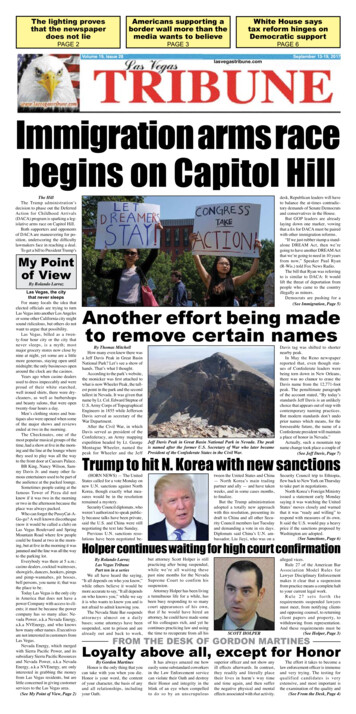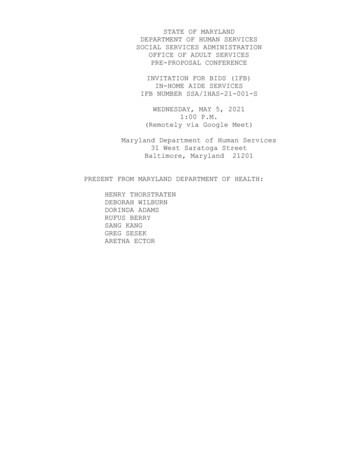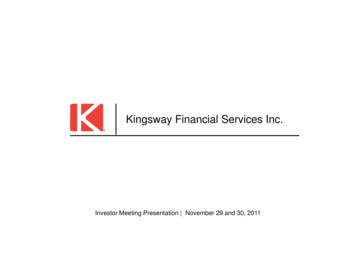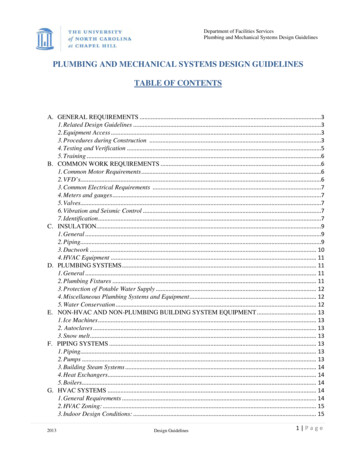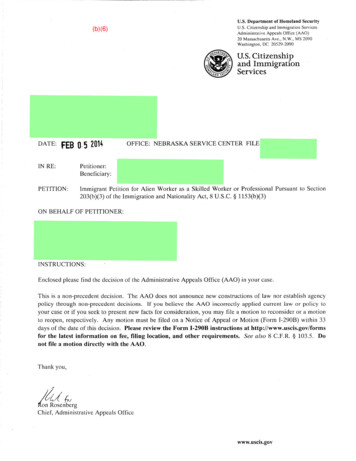
Transcription
U.S. Department of Homeland SecurityU.S. Citi ze nship and Immigration ServicesAd ministrative Appea ls Off ice (AAO)20 Massachusetts A ve ., N.W. , MS 2090Washington, DC 20529-2090(b)(6)U.S. Citizenshipand ImmigrationServicesDATE:FEB 0,5 2014OFFICE: NEBRASKA SERVICE CENTER FILEIN RE:Petitio ner:Beneficiary:PETITION:Immigrant Petition for Alie n Worker as a Skilled Worker or Professional Pursuant to Section203(b )(3) of the Immigration and Nationality Act, 8 U .S.C. § 1153(b )(3)ON BEHALF OF PETITIONER:INSTRUCTIONS:Enclosed please find th e decisio n of the Administrative Appeals Office (AAO) in yo ur case .This is a non-precede nt decision. The AAO does not announce new constructions of law nor establish agencypolicy through non-precedent decisio ns. If you believe the AAO incorrectly applied current law or poli cy toyour case or if you seek to present new facts for consideration , you may file a moti o n to reco nsider or a mo tionto reopen , respectively. Any motion must be filed on a Notice of Appeal or Motion (Form I-290B) within 33days of the date of this decisio n. Please review the Form I-290B instructions at http://www.uscis.gov/formsfor the latest information on fee, filing location, and other requirements. See also 8 C.F.R. § 103.5. Donot file a motion directly with the AAO.Thank yo u,JIU: {o Rose nbergChief, Administrative Appeals Officewww.uscis.gov
(b)(6)NON-PRECEDENT DECISIONPage 2DISCUSSION: The employment-based immigrant visa pet1t10n was initially approved. Upondetermining that the petition had been approved in error, the director served the petitioner with a Notice ofIntent to Revoke (NOIR) the approval of the petition. Subsequently, the director revoked the approval ofthe preference petition. The Administrative Appeals Office (AAO) dismissed the petitioner's appeal.The matter is now before the AAO on a motion to reopen and a motion to reconsider the decision inaccordance with 8 C.F.R. § 103.5. The AAO will grant the motion and affirm the previous decision ofthe director and the AAO's dismissal of the appeal, dated August 31 , 2012. The petition's approvalremains revoked.The regulation at 8 C.F.R. § 103.5(a)(3) provides that a motion to reconsider must offer the reasons forreconsideration and be supported by pertinent legal authority showing that the decision was based on anincorrect application of law or U.S. Citizenship and Immigration Services (USCIS) policy. It must alsodemonstrate that the decision was incorrect based on the evidence contained in the record at the time ofthe initial decision. A motion to reopen must state the new facts to be submitted in the reopenedproceeding and be supported by affidavits or other documentary evidence. 8 C.F.R. § 103.5(a)(2).Counsel reiterates that the AAO's decision relevant to its dismissal of the appeal based on thepetitioner's debarment violated the petitioner's due process rights. 1 Again, counsel cites no legalauthority for this theory and it will not be further considered. The AAO accepts the motion as amotion to reopen and reconsider, but does not concur with counsel's assertion that the dismissal of theappeal should be reversed and the petition approved.In revoking the approval of the Form I-140, Immigrant Petition for Alien Worker, which had beeninitially approved, the director found that theemployment verification letter, dated June 2,2004, that had been submitted with the petition had been determined to contain a forged signature,according to an investigation conducted by United States Citizenship and Immigration Services(USCIS) officers. The director concluded that it called into question the validity of the other1The AAO had issued a Notice of Derogatory Information telling the petitioner that DOL had informedUSCIS that the petitioner had engaged in certain actions that made it subject to mandatory debarmentprovisions of section 212(n)(2)(c)(i) and (ii) of the Immigration and Nationality Act, as amended. Thedebarment period was set from September 30, 2010 to September 29, 2012. Accordingly, noimmigrant visa petitions were able to be approved for this petitioner during the debarment period ,regardless of when it was filed.The petitioner in this case was the subject of an investigation by the DOL in accordance with the H-lBprovisions of the Act. See generally 20 C.F.R. § 655 related to Temporary Employment of Aliens inthe United States; and 8 C.F.R. § 214.2(h) provisions related to H-lB nonimmigrants. If DOLdetermines that there has been a violation of 20 C.F.R. § 655, then under 20 C.F.R. § 655.855( c),USCIS shall not approve a petition during the debarment period: USCIS "shall not approve petitionsfiled with respect to that employer under sections 204 or 214(c) of the INA (8 U.S.C. 1154 and1184(c)) for the period of time provided by the Act and described in Sec. 655.810( )." 1 Therefore ,USCIS may not approve a nonimmigrant or immigrant petition during the debarment period,regardless of when it was filed.
(b)(6)NON-PRECEDENT DECfSIONYage.Jemployment verification documents that the petitiOner had submitted. Moreover, the directordetermined that the beneficiary did not have a four year U.S. bachelor's degree or its foreignequivalent and that the beneficiary's claimed Master's degree was from an unaccredited Indianinstitution, and would not demonstrate that the beneficiary had the required educationIn its decision of August 31, 2012 , the AAO affirmed the director's decision revoking the petition'sapproval for failure to demonstrate that the beneficiary had the required education or its foreignequivalent and the required work experience set forth on the Form ETA 750. As a separate basis fordismissal, the AAO additionally found that the petitioner's debarment prevented the approval of thepetition. The debarment period expired as of September 30, 2012.Counsel's motion was filed on September 28, 2012. Counsel submits a copy of an ADP payroll recordfor November and December 2001 reflecting the beneficiary's name and the name ofone of the beneficiary's claimed prior employers, and a copy of a payroll record withfrom December 2003. Counsel additionally asserts that thethe name of )beneficiary may be found to have equivalent experience to a bachelor's degree in lieu of an actualfour-year bachelor's degree.The AAO would note that the petitioner has never addressed the director's forgery allegation relevantto theletter submitted with the petition. The cumulative submission of payroll records doesnot substantiate the nature and kind of employment. To that end, the AAO issued another Notice ofDerogatory Information (NDI) on June 25, 2013. The AAO advised the petitioner of the following:On September 15, 2010, you filed an appeal of that decision with the AdministrativeAppeals Office (AAO). The AAO dismissed the appeal. The matter is now beforethe AAO on a motion to reopen and a motion to reconsider.The labor certification requires that that the job of programmer analyst requires fouryears of college culminating in a Bachelor's degree or equivalent experience inengineering, math, science or equivalent and 1 year of experience in the job offered or1 year in a related occupation also defined as a programmer analyst.As set forth in the AAO's decision of August 31 2012, theHe reliescredentials evaluation fromunaccredited (possibly "fake"}" Indian Master's degree anddegree to find that they are respectively the equivalent to U.S.2petitioner submitted aupon the beneficiary'sthree-year Bachelor'sbachelor's and masterThe University Grants Commission (UGC)of India states that a "fake" university "isnot established under either Central or State or UGC Act and hence, these institutionsare fake universities/vishwavpidyalas and do not have any right to confer/grantdegrees." See http:L/www.ugc.ac.in/ugcpdf/906434 pressrelease cng.pdf (accessedJune 5, ://www. ugc.ac. in/page/Fake-Universities.aspx (accessed June 5, 2013).
(b)(6)NON-PRECEDENT DECISIONPage 4degrees and that a combination of these degrees along with post-secondary computercourses as well as work experience to conclude that the beneficiary has an"undergraduate degree in Computer Science." The AAO found this evaluation to beunreliable and determined that the beneficiary possessed a 3-year degree fromIndia in chemistry, botany, and zoology? As the evaluationrelied upon the beneficiary's unaccredited Master' s degree and unverified experience,any claimed educational equivalency had not been established. Moreover, the laborcertification required 4 years of college and a specific field of study of engineering,math or science or equivalent and the ETA 750 contained no defined quantifiablelevel of "equivalent" experience. The AAO concluded that the beneficiary was noteligible to be approved in the professional or skilled worker visa classification.As referred to in the prior decisions of the director and the AAO, the employmentdated June 2, 2004 and appearing to be signed byverification letter4 from34The AAO also indicated that it had reviewed the Electronic Database for GlobalEducation (EDGE) created by the American Association of Collegiate Registrars andAdmissions Officers (AACRAO) and found that EDGE considered an Indian"Bachelor of Arts/Bachelor of Commerce/Bachelor of Science" to represent no morethan two to three years of comparable U.S. university study. In Confluence Intern.,Inc. v. Holder, 2009 WL 825793 (D.Minn. March 27, 2009), the court determinedthat the AAO provided a rational explanation for its reliance on information providedby AACRAO to support its decision. In Tiseo Group, Inc. v. Napolitano, 2010 WL3464314 (E.D.Mich. August 30, 2010), the court found that USCIS had properlyweighed the evaluations submitted and the information obtained from EDGE toconclude that the alien's three-year foreign "baccalaureate" and foreign "Master's"degree were only comparable to a U.S. bachelor's degree. In Sunshine RehabServices, Inc. 2010 WL 3325442 (E.D.Mich. August 20, 2010), the court upheld ausers determination that the alien's three-year bachelor's degree was not a foreignequivalent degree to a U.S . bachelor' s degree. Specifically, the court concluded thatUSCIS was entitled to prefer the inform ation. in EDGE and did not abuse itsdiscretion in reaching its conclusion.A beneficiary is required to document prior experience in accordance with 8 C.F.R. §204.5(1)(3), which provides:(ii) Other documentation(A) General. Any requirements of trammg or experience forskilled .workers, professionals, or other workers must be supportedby letters from trainers or employers giving the name, address, andtitle of the trainer or employer, and a description of the trainingreceived or the experience of the alien.(B) Skilled workers. If the petition is for a skilled worker, the petition mustbe accompanied by evidence that the alien meets the educational, training or
(b)(6)NON-PRECEDENT DECISIONPage 5(IT) has been determined by a fraud investigationbased on a telephone conversation with Ms.on June 6, 2008, that this letter wasfraudulent. Further, according to the fraud investigator and based on an e-mailreceived on June 10, 2008 , theresponse from HR Manager,employment verification letter fromdated June 7, 2005 andsigned byalso appears to be fraudulent as the letter is dated after Mr.employment withended in March 2004. As the letters weredetermined to be suspect and based on the information provided appear to contain aforged signature, the AAO intends to make a supplemental finding ofmisrepresentation and/or fraud against the beneficiary. Although the petitionersubmitted evidence of pay that indicates that the beneficiary worked for theseemployers, this does not discount evidence that suggests the experience letters werenot signed by the parties asserted and are fraudulent doc;uments, which weresubmitted in an attempt to establish that the beneficiary has the required experiencefor the position offered and to obtain an immigration benefit.It is noted that only a U.S . employer that desires and intends to employ an alien mayfile a petition to classify the alien under section 203(b )(3)(A)(i) of the Immigrationand Nationality Act (the Act), 8 U.S.C. § 1153(b)(3)(A)(i). See 8 C.F.R. § 204.5(c).The AAO hereby issues this Notice of Derogatory Information relevant to the petitionand informs the petitioner and the beneficiary of derogatory information pertinent tothis proceeding, pursuant to 8 C.F.R. § 103.2(b)(16), which provides in relevant part:(i) Derogatory information unknown to petitioner or applicant. If thedecision will be adverse to the applicant or petitioner and is based onderogatory information considered by [U.S. Citizenship and ImmigrationServices (USCIS)] and of which the applicant or petitioner is unaware,he/she shall be advised of this fact and offered an opportunity to rebutthe information and present information in his/her own behalf before thedecision is rendered, except as provided in paragraphs (b )(16)(ii), (iii),and (iv) of this section. Any explanation, rebuttal or informationpresented by or in behalf of the applicant or petitioner shall be includedin the record of proceeding.With regard to immigration fraud , the Act provides immigration officers with theauthority to administer oaths, consider evidence, and further provides that any personexperience, and any other requirements of the individual labor certification,meets the requirements for Schedule A designation, or meets therequirements for the Labor Market Information Pilot Program occupationdesignation. The minimum requirements for this classification are at leasttwo years of training or experience.
(b)(6)NON-PRECEDENT DECISIONPage 6who knowingly or willfully gives false evidence or swears to any false statement shallbe guilty of perjury. Section 287(b) of the Act, 8 U.S.C. § 1357(b). Additionally, theSecretary of Homeland Security has delegated to USCIS the authority to investigatealleged civil and criminal violations of the immigration laws, including applicationfraud, make recommendations for prosecution, and take other "appropriate action."DHS Delegation Number 0150.1 at para. (2)(1).As an issue of fact that is material to eligibility for the requested immigration benefit,the administrative findings in an immigration proceeding must include specificfindings of fraud or material misrepresentation. Within the adjudication of the visapetition, a finding of fraud or material misrepresentation will undermine the probativevalue of the evidence and lead to a reevaluation of the reliability and sufficiency ofthe remaining evidence. Matter of Ho, 19 I&N Dec. 582,591-592 (BIA 1988).Outside of the basic adjudication of visa eligibility, there are many critical functionsof the Department of Homeland Security that hinge on a finding of fraud or materialmisrepresentation. For example, the Act provides that an alien is inadmissible to theUnited States if that alien seeks to procure, has sought to procure, or has procured avisa, admission, or other immigration benefits by fraud or willfully misrepresenting amaterial fact. Section 212(a)(6)(C) of the Act, 8 U.S.C. § 1182. Additionally, theregulations state that the willful failure to provide full and truthful informationrequested by USCIS constitutes a failure to maintain nonimmigrant status. 8 C.P.R. §214.1(f). For these provisions to be effective, USCIS is required to enter a factualfinding of fraud or material misrepresentation into the administrative record. 5With regard to the current proceeding, section 204(b) of the Act states, in pertinentpart, that:After an investigation of the facts in each case . the [Secretary ofHomeland Security] shall, if he determines that the facts stated in thepetition are true and that the alien . in behalf of whom the petition ismade is an immediate relative specified in section 201(b) or is eligiblefor preference under subsection (a) or (b) of section 203, approve thepetition .5It is important to note that while it may present the opportunity to enter anadministrative finding of fraud, the immigrant visa petition is not the appropriateforum for finding an alien inadmissible. See Matter of 0, 8 I&N Dec. 295 (BIA1959). Instead , the alien may be found inadmissible at a later date when he or shesubsequently applies for admission into the United States or applies for adjustment ofstatus to permanent resident status. See sections 212(a) and 245(a) of the Act, 8U.S.C. §§ 1182(a) and 1255(a). Nevertheless, the AAO has the authority to enter afraud finding, if during the course of adjudication, it discovers fraud or a materialmisrepresentation.
(b)(6)NON-PRECEDENT DECISIONrage1Pursuant to section 204(b) of the Act, USCIS has the authority to issue adetermination regarding whether the facts stated in a petition filed pursuant to section203(b) of the Act are true.A labor certification is subject to invalidation by USCIS if it is determined that fraudor a willful misrepresentation of a material fact was made in the labor certificationapplication. See 20 C.F.R. § 656.30(d) which states the following: "After issuancelabor certifications are subject to invalidation by [USCIS] . upon a determination,made in accordance with those agencies, procedures or by a Court, of fraud or willfulmisrepresentation of a material fact involving the labor certification application. "tiSection 212(a)(6)(C) of the Act governs misrepresentation and states the following:"Misrepresentation. - (i) In general. - Any alien who, by fraud or willfullymisrepresenting a material fact, seeks to procure (or has sought to procure or hasprocured) a visa, other documentation, or admission into the United States or otherbenefit provided under this Act is inadmissible. "76The underlying labor certification supporting this application may be invalidatedpursuant to 20 C.F.R. § 656.30, which provides in pertinent part:(d) After issuance, a labor certification is subject to invalidation by theDHS or by a Consul of the Department of State upon a determination ,made in accordance with those agencies' procedures or by a court, offraud or willful misrepresentation of a material fact involving the laborcertification application. . ." Further, it is noted that section212(a)(6)(C)(i) of the Act provides that any "alien who, by fraud orwillfully misrepresenting a material fact, seeks to procure (or has soughtto procure or has procured) a visa, other documentation, or admissioninto the United States or other benefit provided under this Act isinadmissible.7The term "willfully" in the statute has been interpreted to mean "knowingly andintentionally," as distinguished from accidentally, inadvertently, or in an honest beliefthat the facts are otherwise. See Matter of Healy and Goodchild, 17 I&N Dec. 22, 28(BIA 1979) ("knowledge of the falsity of the representation" is sufficient); Forbes v.INS, 48 F.3d 439, 442 (9th Cir. 1995) (interpreting "willfully" to mean "deliberateand voluntary") . Materiality is determined based on the substantive law under whichthe purported misrepresentation is made. See Matter of Belmares Carrillo, 13 I&NDec. 195 (BIA 1969); see also Matter of Healy and Goodchild, 17 I&N Dec. 22, 28(BIA 1979). A misrepresentation is material where the application involving themisrepresentation should be denied on the true facts, or where the misrepresentationtends to shut off a line of inquiry which is relevant to the applicant's eligibility andwhich might well have resulted in a proper determination that the application bedenied. See Matter of S--and B--C--, 9 I&N Dec. 436, 447 (AG 1961).
(b)(6)NON-PRECEDENT DECISIONPage 8The certified pos1t1on requires one year of experience in the job offered ofprogrammer analyst or one year of experience in a related occupation, also defined asa programmer analyst. The beneficiary 8 appears to have submitted fraudulent andforged documentation in an attempt to qualify for the position offered.If you elect
equivalent degree to a U.S . bachelor's degree. Specifically, the court concluded that USCIS was entitled to prefer the information. in EDGE and did not abuse its discretion in reaching its conclusion. 4 A beneficiary is required to document
